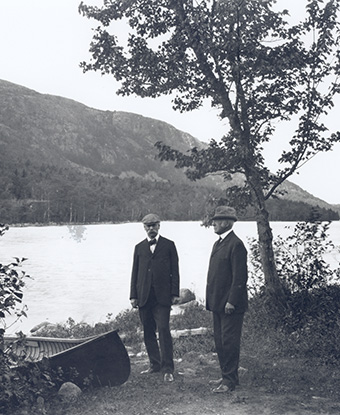Last updated: February 11, 2022
Person
Charles W Eliot

NPS Archives
Charles W. Eliot, president of Harvard University, a founder of Acadia National Park, father to two other prominent players in Acadia's history, summer resident, philanthropist, Eugenicist.
Charles W. Eliot was born into a wealthy Boston family and graduated from Harvard in 1853. He was bright and ambitious and taught there until 1863. He traveled in Europe and studied education and business methods there. Early in 1869, Eliot published his ideas about reforming American higher education in The Atlantic Monthly. “We are fighting a wilderness, physical and moral,” he declared in setting forth his vision of the American university, “for this fight we must be trained and armed.” The articles resonated powerfully with the businessmen who controlled the Harvard Corporation, and shortly after their appearance, he was elected at 35 as the youngest president in the history of the nation’s oldest university.
An often untold story surrounding President Eliot, was his involvement in the Eugenics movement which used unscientific and racially biased views to advocate for a reproductive approach to human populations to increase the occurrence of 'desirable' human characteristics. Eliot was a prominent voice in the Eugenics movement due to his position at Harvard University. The eugenics movement had various intersections with the conservation movement and founding of the national parks, which continue to be explored and researched today.
Inspiration
As impressive as his early years in education were, for us he is best known for his role in the creation of Acadia National Park. A summer resident of Mount Desert Island, Eliot found an article by his deceased son Charles for Garden and Forest, noting the increase in private land ownership in Maine might eliminate public access to its scenic beauties: The younger Eliot wrote:
It is time decisive action was taken, and if the state of Maine should encourage the formation of associations for the purpose of preserving chosen parts of her coast scenery, she would not only do herself honor, but would secure for the future an important element in her material prosperity.
He died at 38 and didn’t have the opportunity to act upon these preservation ideas; his father, however, took decisive action. Charles W. Eliot brought these ideas to Mount Desert Island in 1901, and the wealthy summer community was receptive. Since the 1880s, these summer visitors had organized themselves into public-spirited Village Improvement Societies. Their concerns ranged from sanitation and cultural events to the building of hiking trails. Eliot proposed they create an organization to set aside special lands.
Hancock County Trustees of Public Reservations
On September 12, 1901, the Hancock County Trustees of Public Reservations was incorporated for the purpose of “…acquiring, owning and holding lands and other property in Hancock County for free public use.” Donations were slow at first, but the tracts kept growing through the tireless work of the Trustees. Eliot continuously lobbied that every resident should treat the entire island as if it were a park.
The efforts of the Trustees were not without criticism. The withdrawal of so much land from town tax rolls provoked a challenge in the Maine legislature to repeal the group’s tax-exempt status, which would make the land too expensive to retain. The measure was defeated, but Trustee George Dorr feared they would be challenged again, and he believed the only way to truly protect Trustee lands was to attain national park status. With Eliot’s blessing, Dorr pursued national park status, and in 1916, presented 5,000 acres to the American people in the form of a national monument, penned into existence by President Woodrow Wilson. An act of Congress in 1919 designated the area as the first national park east of the Mississippi River.
While Charles W. Eliot earlier transformed a provincial college into a preeminent American research university and served the longest term as president in Harvard’s history, his work to honor the vision and ideals of his son developed into a lasting gift for all who live and visit here, preserving for all time pristine and unique landscapes. For that he will be remembered for generations.
